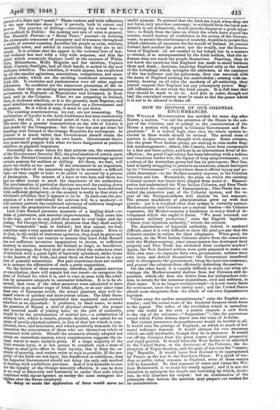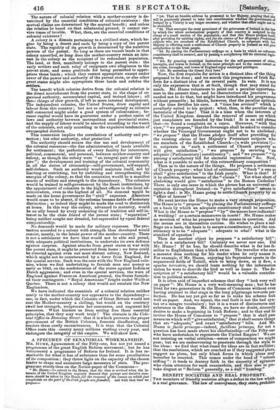HOW TO DISPOSE OF OUR COLONIAL ENCUMBRANCES.
SIR WILLIAM MOLESWORTH has notified for Some day after Easter, a motion, "to call the attention of the House to the sub- ject of the Colonies, and to submit to the consideration of the House a motion with regard to Colonial Government and Ex- penditure." It is indeed high time that the whole system in- cluded in these words should be revised. The actual state of matters is disastrous and fraught with danger. Some colonies, like the great West Indian group, are sinking to ruin under Eng- lish mismanagement ; others, like Canada, have been exasperated by a fast and loose policy, and kept in an intermittent fever of dis- affection; the great Cape colony has been labouring with a tedious and vexatious border war, the legacy of long misgovernment; not a colony of the Australian group but has its grievances ; New Zea- land is barely struggling to preserve an existence, almost destroyed by its " Government" : everywhere there is official injury and po- pular discontent—to the Mother-country expense, to the Colonies vexation and loss. Meanwhile, the pleas on which the existing Colonial system was based have slipped from under it : Emanci- pation has undermined the West Indian Colonies, and Free Trade has revoked the conditions of Emancipation ; Free Trade has an- nulled the protective part of the Colonial system, and the re- peal of the Navigation-laws will abolish its last remnant. The present machinery of administration grew up with that system : yet it is retained after that system is virtually extinct. Mother-country and Colonies are a mutual burden—the Colonies expensive, the Mother-country a hindrance to every kind of de- velopment which she ought to foster. "We must retrench our expensive military protection," cries the English legislator. "Abate your injurious authority," retorts the colonist. The maintenance of Imperial authority, indeed, is rendered difficult, since it is very difficult to show the quid pro qua that the Colonies receive in return for their allegiance. What good, for instance, do the West Indian Colonies derive from the connexion with the Mother-country, since emancipation has destroyed their property and Free Trade has abolished their exclusive market Again, the New Zealand settlers were quite prepared to make out their own case—to organize their own government, enforce their own laws, and defend themselves : the Government interfered only to disorganize the government, bring the laws into contempt, and prevent the colonists from efficiently defending themselves. On the other band, it is equally difficult to make out what ad- vantage the Mother-country derives from her Colonies still de- pendent, which she does not derive from her independent colo- nies, in return for the immense expenditure, civil and military, in their name. It is no longer exclusive trade—it is not waste lands for settlement, since they are barely used ; and the United States absorb more emigrants than the whole of our own dependencies together. "Cast away the useless encumbrances," cries the English eco- nomist; and the actual state of the Imperial finances lends force to the appeal. The reflex of the revolution which is spreading over the world as fire over a prairie imparts a new force to the cry of the colonists—" Separation ! "—like the portentous sound which Pallas Athena threw into the voice of Achilles.
But violent premature dismemberment would be hurtful to all. It would ruin the prestige of England, on which so much of her moral influence depends. It would alienate for ever resources which are still invaluable, though they lie in abeyance. le would cut off the Colonies from the great source of instant prosperity and rapid growth. It would leave the West Indies to be absorbed in the United States, to the detriment of the Colonies, the de- struction of Neg,ro freedom, and the gain of not even the " annex- ing" Republic. It would leave New Zealand to be appropriated by France as the key to the Southern Ocean. If a spark of wis- dom or public virtue remains in England, none of these results will be hazarded. To that remnant of sense and virtue Sir Wil- liam Molesworth is to make his timely appeal ; and it is not our intention to anticipate the details and reasoning by which, doubt- less, he will illustrate his subject : but an examination of the principles that bottom the question may prepare our readers for its consideration.
The nature of colonial relation with a mother-country is de- termined by the essential conditions of colonial existence : the mutual claims are determined by the mutual benefit ; and unless the relation be based on that substantial ground, it cannot sur- vive times of trouble. What, then, are the essential conditions of colonial existence?
A colony is a domain pertaining to a civilized state, which be- gins by being a desert and ends by being a copy of the parent i state. The rapidity of its growth s determined by the nutritive powers of the parent. So long as there are vacant lands in that colony unsettled, so long does the mother-country retain an inte- rest in the colony as the recipient of its redundant population. The.land, at first, manifestly belongs to the parent state : the early settlers and each relay of emigrants owe allegiance to the parent state, and some gratitude for being permitted to appro- priate those lands ; which they cannot appropriate except under cover of the power and authority of the parent state, or else other great states might also appropriate those lands and subdue the settlers.
The benefit which colonies derive from the colonial relation is the direct nourishment from the parent state in the shape of or- ganized authority, accumulated capital, and trained labour ; all three things of slow growth, if left to mere internal development. The independent colonies, the United States, draw capital and labour from this country ; but not so advantageously as colonies still connected might under a good system of colonization ; be- cause capital would have its guarantee under a perfect union of laws and authority between metropolitan and provincial states, and the supply of labour would be assorted according to the wants of the colonists, not only according to the expulsive tendencies of overpeopled districts.
This connexion implies the correlatives of authority and pro- tection ; but what authority, what protection ? The authority should secure the due use and development of the colonial resources—the due administration of lands available for settlement; the perfection of every facility for intercourse, political, commercial, and personal, between mother-country and -colony, as though the colony were "an integral part of the em- pire"; ; the development and training of the colonial community m all the duties of citizenship—self-government, self-support, self-defence. Such an authority would maintain itself, not by limiting or restricting, but by unfolding and strengthening the energies of the colony, so that the connexion would be a manifest source of welfare and strength to the dependency. The colonists would be trained to self-government by the freest institutions, by the appointment of colonists to the highest offices in the local ad- ministration, even to the highest of all. No demand would be made on the home government for " civil " expenses. Absentees would cease to be absent, if the colonies became fields of honorary distinction; as indeed they might be made the road to distinction at home. In this way the colony, advanced to maturity, would be an ally bound by every endearing tie of tradition and self-in- terest to be the close friend of the parent state ; "separation" being neither sought nor dreaded, but superseded by equal federal companionship. No demands would be made for military expenses. The pro- tection accorded to a colony with strength thus developed would consist, mostly, in the latent power of the mother-country. There is not a settlement we have that would not be able and proud, with adequate political institutions, to undertake its own defence against surprise. Against attacks from great states at war with the parent state, it might be protected from home : no force could be directed against even our most distant colony, New Zealand, which might not be counteracted by a force from England, for the special service. Such was the case with the New England colo- nies, whom we find undertaking to furnish men and money so early as 1643, on the confederation of the states against Indian or Dutch aggression; and even in the special services, the wars of England against France on American ground, the States furnish- ed their contingents : "Royal Americans" fought under Wolfe at Quebec. There is not a colony that would not emulate the New Englanders. We have indicated the essentials of a colonial relation neither costly to the mother-country nor oppressive to the dependency— one, in fact, under which the Colonies of Great Britain would not cost the Mother-country a shilling, but would on the contrary swell her strength, reciprocate her commerce, and augment her resources. What hinders us from setting free these essential principles, that they may work truly ? The obstacle is the Colo- nial Office in Downing Street: that it is which prevents the proper government of the British Colonies, foments disaffection and renders them costly encumbrances. It is thus that the Colonial Office costs this , ountry many millions sterling every year, and endangers the integrity of the empire. We will show how.



























 Previous page
Previous page